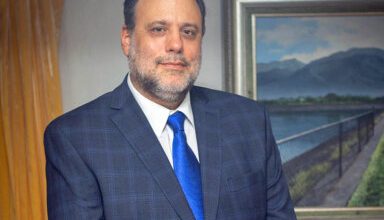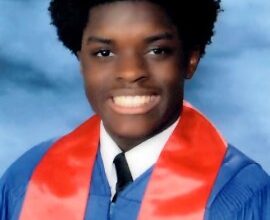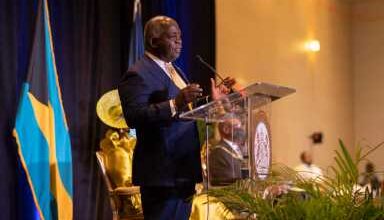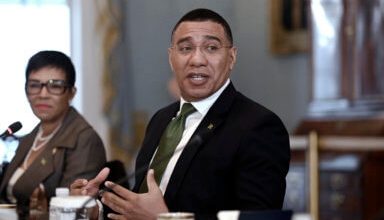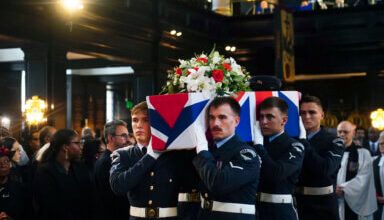Fenimore St. United Methodist Church focuses on ‘Black Resistance’
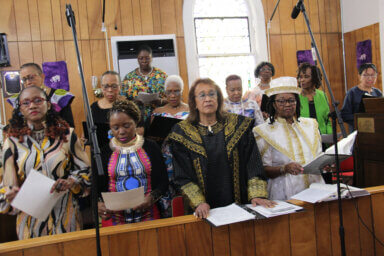
Several dignitaries and distinguished members of the community were on hand as the 133-year-old Fenimore Street United Methodist Church (FSUMC), on the corner of Fenimore Street and Rogers avenue in Brooklyn, on Feb. 26 celebrated its annual “Heritage Sunday” focusing on the 2023 National Black History Month theme, “Black Resistance.”
Newly-appointed St. Vincent and the Grenadines Consul General to the United States, Rondy “Luta” McIntosh; former Deputy Consul General Cyril “Scorcher” Thomas, also a Vincentian cultural ambassador; and Dr. Paul Clement and Prof. Martin Felix, Grenadian-born professors at the Fashion Institute of Technology (FIT), State University of New York were among worshippers – most of whom were splendidly adorned in African outfits – during the near three-hour-long celebration organized by the church’s Heritage Committee.
Among other things, the celebration featured drumming and narration by Eric Frazier, a renowned Brooklyn drummer, and Min. Cynthia Grant, narrator and member of the church’s Chancel Choir; rousing congregational hymns — “Fix Me Jesus,” “We’ve Come This Far By Faith,” “I will Trust in The Lord” and “Faith of Our Fathers”; anthem, “Jesus is a Rock in a Weary Land”, by the Combined Choir; United Voices of Praise (UVOP); praise and worship led by the church’s young adults; liturgical dance by the young adults to “Rocka My Soul in the Bosom of Abraham,” taken from Alvin Ailey’s “Revelations”; “Black History Moment” by young adult Ezinne Nwosu, a senior nursing student; and messages by McIntosh and Dr. Nelson A. King, a certified United Methodist Church lay speaker, journalist and adjunct college professor.
St. Vincent and the Grenadines Consul General Rondy “Luta” McIntosh delivers message. Photo by Nelson A. King
In his address, McIntosh, who was appointed consul general last August by Prime Minister Dr. Ralph E. Gonsalves, told celebrants that “a man who knows not his past is always uncertain about his present and his future.”
He noted that Black History Month was officially recognized in 1976 by President Gerald Ford “to uplift the often-neglected accomplishment of Black Americans.
“But, just as long as there have been efforts to uplift Black History, there have been attempts to discredit and invalidate it as well,” said McIntosh, who brought along his wife, Semone, and their teen-aged daughter. “Every year, credit is given to President Ford for this recognition on Blacks in America, but little is said about the pioneer of it all.
“He was the son of former slaves and the second Black American to earn a doctorate from Harvard University,” the consul general added. “He was the founder of the modern-day Association for the Study of African American Life and History, and spearheaded a week in February, from 1926, dedicated to Black History, which eventually grew into the month-long tradition we know today. His name is it Carter G. Woodson.”
As recent as 2022, McIntosh said 14 states signed provisions into law that restrict teachings of racial justice and Black contributions to American History under the guise of “anti-critical race theory legislation.”
“This we see as a direct attempt to erase Black History from the classroom and manipulate a rewritten version of history,” he said. “Every time you sit on a bus, remember Rosa Parks who, on Dec. 1, 1955, sat on that bus and was arrested.”
McIntosh noted that this sparked the Montgomery Bus Boycott and mass protest for 13 months that ended with the US Supreme Court ruling that segregation on public transportation is unconstitutional.
“Do we have any Rosa Parks in our society today who is willing and ready to stand up to oppression and systemic racism?” he asked.
“Whenever you open your refrigerator, remember Frederick McKinley Jones, who developed the refrigeration equipment in the 1930s to preserve food items on planes, trains, ships, etc.,” he added. “Evert time you ride a train, remember Granville T. Woods, who invented the induction telegraph system, which allows traveling trains to communicate with one another, while also allowing workers to locate them.
“Every time you drive on the road and approach a stoplight, remember Garrett Morgan, who invented the third ‘caution’ signal, which he patented in 1922, which we now know as the yellow light,” McIntosh continued. “And in 1912, Morgan received a patent for his ‘Breathing Device,’ which was one of the earliest versions of a gas mask.
“I say these things to say that we are a great people, who have been stifled and marginalized for a very long time,” he said before to “our Caribbean and African American brothers and sisters”.
“We went through a lot, but we survived,” the consul general stressed. “Our ancestors, grandparents and parents fought to bring us this far; let us not drop the ball and give up. There is a long road ahead and the race is not finished.
“We must encourage our youths to come to the House of the Lord, and we must impart the morals, values and disciplines we were taught to our children,” he urged. “They are more privilege than we were in our days, but we must let them know our history, so they will have an appreciation that, the things they enjoy today, many of our people died so they can have access to them.
“Let’s move forward together by supporting each other, by encouraging each other, by lifting up each other, because this struggle takes a unified force; and, together, we will eventually reap the victory,” McIntosh affirmed.
Dr. King – who taught Caribbean History in secondary and post-secondary institutions in his native St. Vincent and the Grenadines, and US History, African American History, World Civilization, Political Science, Social Sciences and Economics in colleges in New York – told worshippers that Black Americans’ resistance to racial inequality has “deep roots” in US History, stating that it has taken many forms – from slave rebellions during the colonial era and through the Civil War to protest movements in the 1950s, ’60s and currently.
He said Blacks have resisted all forms of oppression, especially the racial terrorism of lynching, racial pogroms and police killings “since our arrival upon these shores.”
“Black people have had to consistently push America to live up to its ideals of freedom, liberty and justice for all,” said Dr. King, in delivering the message, “Black Resistance and Faith: Have We Overcome?”
“But given all that I’ve said about ‘Black Resistance’, let’s revert to the overarching question: ‘Have We Overcome?’” he urged. “That’s a question that we must seriously ponder, as we celebrate Black History Month under this year’s theme of ‘Black Resistance’.
Drummers during Heritage Sunday celebration at Fenimore St. United Methodist Church which focused on ‘Black Resistance.’ Photo by Nelson A. King
But “where do we find our strength?” asked Dr. King before showing a video of the late Rev. Dr. Martin Luther King, Jr.’s famous “I Have a Dream” speech. “The answer is in the Lord our God!”
Then, after a series of scripture references, he urged the congregation to hold hands in singing “We Shall Overcome,” popularized during civil rights protests in the 1950s and ‘60s.
“Once again, the gifts, talents and God-inspired worship experience were on full display during this past Sunday’s celebration of our heritage at Fenimore Street United Methodist Church,” the church’s pastor, the Rev. Roger Jackson, a native African American, told Caribbean Life. “The program was well thought out and our brother, Dr. Nelson King’s reminded us of the various people and ways in which we as a people have resisted racism and racist ideologies by achieving great things with the help and strength that comes from our relationship with God through Jesus Christ.
“To God be the glory for the great things He has done, is doing, and will continue doing for us, and through us for His name sake!” he added.
Grenadian professors: Dr. Paul Clement, right, and Prof. Martin Felix. Photo by Nelson A. King
Barbadian-born Sophia Eversley, who directs the Combined Choir, said she was moved by the celebration, complimenting the young adults for their singing and dancing.
“I was truly blessed by their singing and was very happy with their continued dedication,” she said, adding that she was also stimulated by McIntosh and King’s messages.
Trinidadian Marlene Ferguson — who, with Belizean Barbara Moody, co-chairs the Heritage Committee — said the theme for “Heritage Sunday” was “a legacy of love, faith, service and hope for all mankind to live as the family of God.
“’Heritage Sunday’ is an occasion when we celebrate our ancestral heritage in spiritual songs, dance and proudly wear our bold, brightly-colored African attire,” she told Caribbean Life. “The highlight of Heritage Sunday service was the participation of the young adults who conducted the praise and worship, singing songs in African dialect.
“Their liturgical dance presentation reflected to me that they are proud of their culture and heritage, which instilled good work ethics, strong moral character, and a steadfast faith nurtured in hope,” Ferguson added. “This is the blessing of our heritage, which we must continue to offer our youths.
Young adults perform a liturgical dance. Photo by Nelson A. King
“The sermon ‘Black Resistance and Faith’ was rich in historic interpretation, which renewed our awareness in the life of our ancestors,” she continued. “The message reflected on their devotion, commitment and steadfast love, trusting God for deliverance from bondage.”
Fenimore United Methodist Church of Flatbush was organized “out of the first Methodist Episcopal Church on Lenox Road and Flatbush Avenue and was incorporated on Aug. 20, 1889,” according to the church’s history.
The church was formally admitted to the New York East conference in April 1890 and dedicated in May 1890.
Over the years, the church has adapted to the changing demographics of the neighborhood.
Following the merger in 1968 of the Methodist and Evangelical United Brethren denominations, the congregation has been known as the Fenimore Street United Methodist Church.

